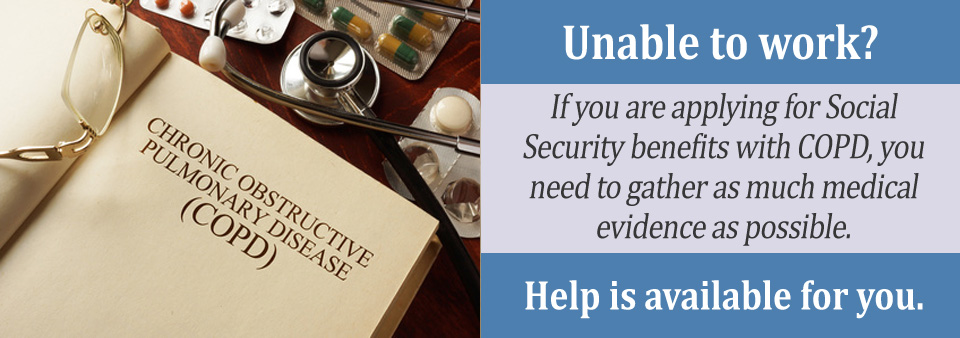Chronic obstructive pulmonary disease (COPD) leads to irreversible lung damage. The most common forms of COPD are emphysema and chronic bronchitis. You can explore the list of medical conditions for disability approval here. More than three million people are diagnosed with the condition each year.
While treatment can help the patient manage the condition, it cannot be cured. If you have advanced COPD, you may find yourself unable to work and earn a living. In that case, you may qualify for Social Security Disability benefits with COPD. The condition may be chronic, or it could be lifelong. Common symptoms include shortness or breath, wheezing, and/or a chronic cough.
There are four stages of COPD, and your stage is based on your test results. The severity of the condition is determined by your symptoms, exacerbation risk, and your spirometry results.
Group A is for patients who are low risk with less symptoms. Group B patients are low risk with more symptoms. Group C is for those with less symptoms, but who are high risk. Group D are patients who have more symptoms and who are higher risk.
How COPD Affects Your Physical Capacity For Work
Because COPD affects your oxygen levels, your body – including your muscles and organs – don’t get the oxygen they need to function properly. This can affect your ability to stand, lift, reach, stretch, and bend.
It can also cause you to tremble or shake, so you are limited on what you can do, including how much you can lift and carry. This can be enough to keep you from performing any physical work.

How COPD Affects Your Mental Capacity For Work
COPD can take its toll on your body, both physically and mentally. The lack of oxygen can lead to extreme tiredness and fatigue. This can affect your ability to concentrate and to retain information. You may find yourself unable to focus. Also, it can cause anxiety because you become afraid of the inability to breathe, and it can be stressful because of the treatment regimen and the condition’s unpredictability.
You may become more socially withdrawn, and you may find yourself unable to remember important details or focus on a task long enough to get it complete. Your condition can also lead to depression, which will affect your mental capacity immensely. When depressed, you stay tired, you are forgetful, you don’t like to socialize, your communication skills aren’t as strong, you aren’t as productive, and you may find it impossible to stay focused on a task or to get any work done.
COPD and Applying For Social Security Disability
The disability claims process is complex, and detailed medical evidence and supporting documentation are essential to a successful claim. You should have medical evidence to confirm your diagnosis, confirm the severity of your symptoms, detail your treatment plan and explain all restrictions and limitations.
An attorney can help you make sure you have enough medical evidence to support your claim. Without legal assistance, you may accidentally forget to add key information for your claim. SSD lawyers work on contingency fees, so you won’t need to pay anything upfront. Get a Free Case Evaluation for your disability claim today.